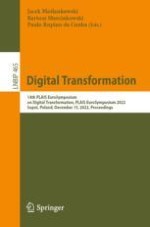This book constitutes the refereed proceedings of the 14th PLAIS EuroSymposium 2022 which was held in Sopot, Poland, on December 15, 2022.
The objective of the PLAIS EuroSymposium is to promote and develop high quality research on all issues related to digital transformation. It provides a forum for IS researchers and practitioners in Europe and beyond to interact, collaborate, and develop this field. The leading topic for the EuroSymposium this year was “Digital Transformation”.
The 8 papers presented in this volume were carefully reviewed and selected from 23 submissions. They were organized in topical sections named: artificial intelligence; creativity and innovations; big data, internet of things and blockchain technologies.
